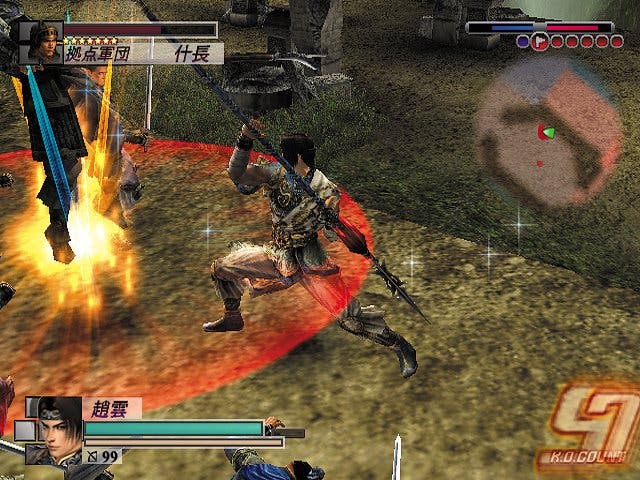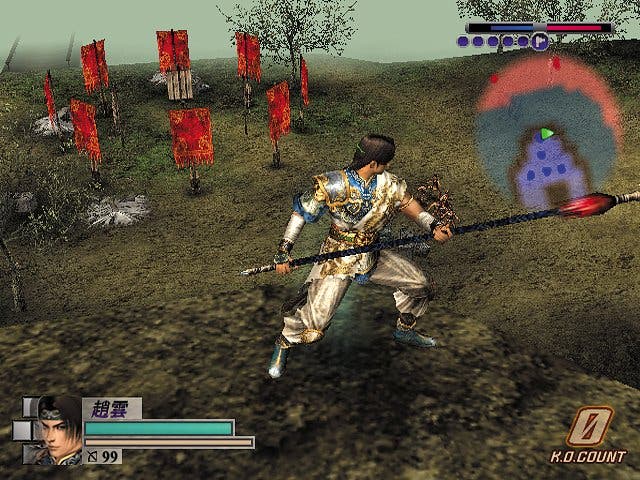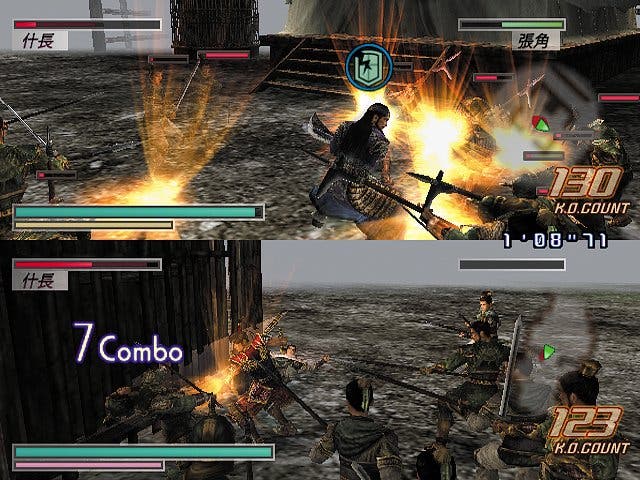Dynasty Warriors 4: Empires
We originally thought it said 'Vampires'. That would've been more interesting.
Keeping franchises fresh is a hit and miss affair, and, like arguing with an abusive imbecile that refuses to see sense and appears to speak Martian, is often pointless. Many classic games succeed simply because they do one thing very well. Burnout works because it lets you crash cars brilliantly. Bangaio lets you shoot things with a near-religious perfection. Dynasty Warriors lets you mow down dozens of opponents in 3D with various weapons and makes your little heart pop through your shirt like no other game can. Problems arise when, four or five games in, there's an apparent need to mix things up to keep the cash registers ringing. We're seriously okay for Burnout F1 and Bangaio Cricket, thanks.
But here we are with Dynasty Warriors 4: Empires, a fusion of the famed mass 3D combat of previous Dynasty Warriors titles and a Risk-style strategy element. Koei's Dynasty series has dabbled, largely successfully, with two strategy titles in the guise of Dynasty Tactics and a sequel. However, world's colliding in Empires provides a more rounded version of both the fighter and the chess-like stratagems of the latter in one average whole. Which is a crying shame.
"I'm Massive and Chinese!"

Empires is set in feudal China, as are all the other games in the series, and charges you with the task of conquering the entire nation - which is broken into 24 separate regions - by being fantastically violent with melee weapons and indulging in some fairly basic strategy.
After selecting the difficulty level, the player in Empire mode is then greeted to a cut-scene that shows off his three generals. The graphical style of the game is gloriously over the top, with armour matched only in its pomposity by gruff, barked clichés regarding "honour" and "ambition" and soldiers battering around below the commanders, shouting over the wail of electric guitar. Cheesy enough.
The game then settles into switching between a strategy turn and a combat turn. The former takes place on a "board", a map of China. You must pick regions to invade, are given choices regarding alliances with other warlords, and can choose to follow the proposals of one of your generals per turn. These orders allow you to add troops to each of the generals' armies, stimulate the economy in order to accrue more gold to pay soldiers, and so on. Gold is also accumulated through capturing more territories. Run out of gold and you can't afford good generals, can't recruit captured soldiers and can't pick the better choices from your soldiers in the strategy portion of your turn. It's pretty basic stuff.
Then into the combat. Before entering the fight proper, you need to select which general you're going to actually control during the invasion. Characters are seriously different in terms of speed and weapons, and some are far better suited to full on combat surrounded by troops than others. Weapon length and special attacks make a real difference in Dynasty Warriors, so if you're going into combat against a serious foe, you'd better make the right choice. Or it's troop loss and general humiliation. And you don't want that. As you progress through the game various weapons and objects become available for the generals to use. All can be equipped during this stage.
On The Dancefloor

Then you're in. Empires' combat consists of you charging around maps, each of which is depicted in the bottom corner of the screen, killing opponents in areas so they switch from the enemy colour to the allied colour. The generals you chose not to control fight alongside you, defending "strongholds", following you across the map if you start to make in-roads and generally doing what fighting people do. Which is fight.
On the subject of fighting: as mentioned before, the one thing Dynasty Warriors does very well is let you carve up dozens of enemies on screen with melee weapons. It's you, surrounded by officers on horseback, foot soldiers and archers swinging a sword and a mace, watching the KO counter climb ever higher. It's cathartic and fun. Dozens of characters appear on screen, and PS2 makes a sterling job of not dropping frames aside from in very heavy action. Each character has special moves, some of which are far more effective in close situations than others, some of which you'll need for ranged attacks, but you'll largely be using basic swinging moves that can be linked into combos, all flowing from the same button press.
There's more strategy involved in the combat than you think. Charging off and just trying to kill everyone works up to a point. Later, and the battles become genuinely enormous, you'll have to rally around co-generals to succeed, defending them, blocking reinforcements from the enemy by legging it to hot spots on the map and being generally on the ball. If you lose your stronghold it's over and you're back to the map with no territory gained.
But that's it. And when the battles stretch to 40 minutes (really) and you bugger it up because you let the tide of war slide just that little too much, the desire to put down the pad becomes very strong indeed.
The Bad Lieutenant

If you succeed in either killing the opposing commanders or taking their stronghold (these are the only two objectives of any of the missions, sub-quests being dumped from previous iterations), you're given points for killing "worthy opponents", the amount of total KOs and any multipliers you picked up during combat, along with any of the other objects you find along the way, such as armour for defence and boots for speed, all of which can be equipped in the next combat round.
Enemy lieutenants and generals can also be captured and hired. If you haven't got enough money to pay them, they're released. As you capture more territory, you can employ more generals over the original three you begin with. Then it's back to the strategy map.
There are four two-player modes - Vanquish (defeat more enemies than your opponent), Pilfer (a bizarre game involving running around, finding items and giving them to a merchant), Melee (knock your opponent off a bridge) and Endurance (survive longer than the opponent) - played in split-screen, but none of them are especially arresting. And when the Empire mode becomes quickly boring, we have something of a problem, Shogun.
Colonial Irrigation
Empire mode becomes repetitive too quickly, and doesn't provide either the strategic depth in the "board" sections or the real thrill, bluster and mania of Dynasty Warriors 3 (elephants!) in the combat sections to keep you truly interested. Empire mode is a long deal. Unfortunately, there's not enough variety to keep it from feeling like a trudge. It's a shame to call Empires an average game, but that's what it ultimately is. A case of Jack of all trades, master of none. Rent before you buy.

